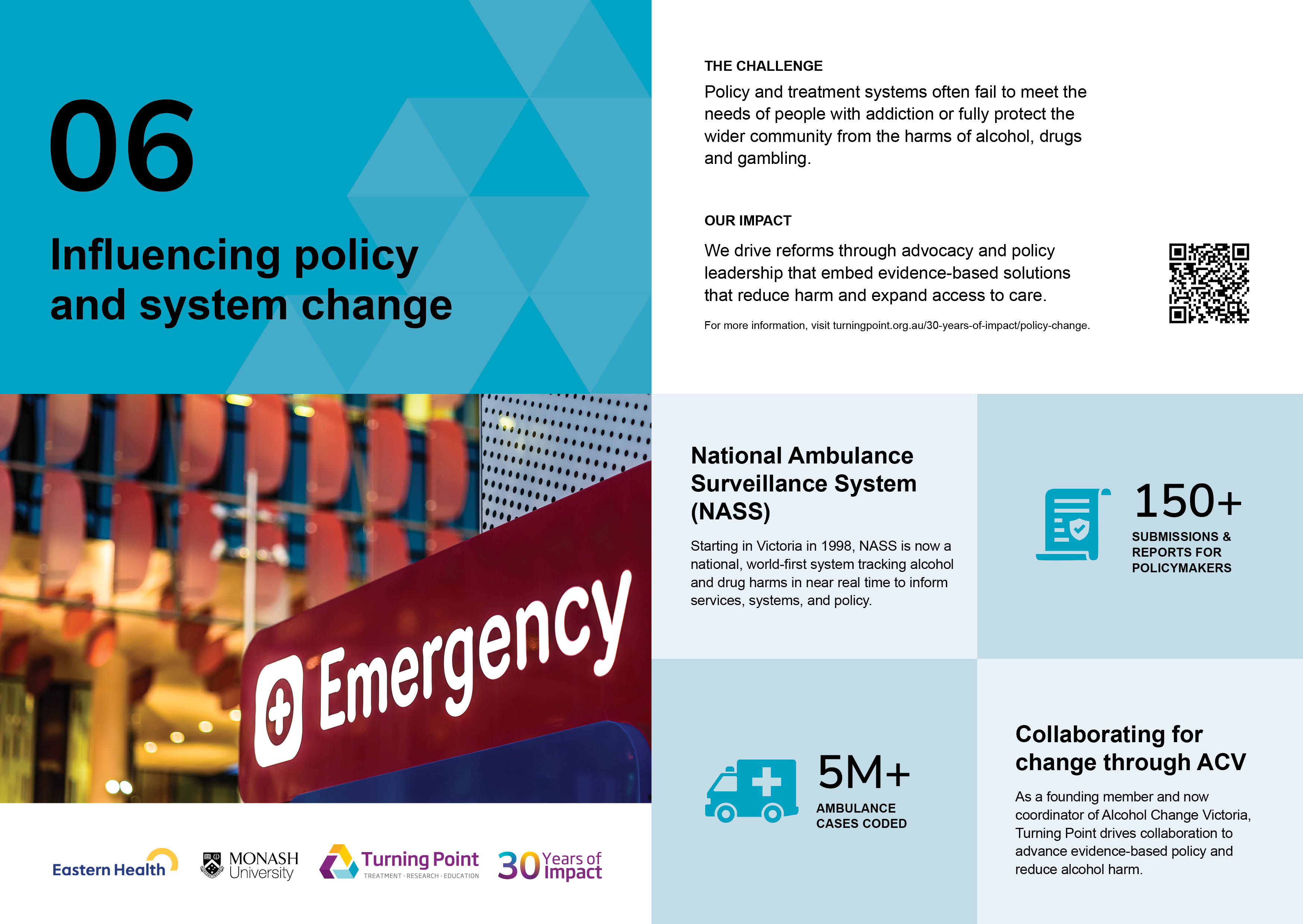The Challenge
Policy and treatment systems often fail to meet the needs of people with addiction or fully protect the wider community from the harms of alcohol, drugs and gambling.
Our Impact
We drive reforms through advocacy and policy leadership that embed evidence-based solutions that reduce harm and expand access to care.
150+
submissions & reports for policymakers
5M+
ambulance cases coded
30K+
visits annually to AODstats
18
Alcohol Change Victoria partner organisations
Major Milestones
National Ambulance Surveillance System (NASS}
Since 1998, Turning Point has led a world-first program utilising paramedic records to track acute alcohol and drug harms in the community. By providing near real-time data, this system has become a vital tool for policymakers, researchers, and health services to design interventions, shape policy, and evaluate their impact.
The system highlights geographic and demographic trends, ensuring treatment and prevention are targeted where they are most needed. Initially focused on Victoria, the National Ambulance Surveillance System (NASS) now operates nationally (excluding WA and SA), transforming how Australia monitors, understands, and responds to alcohol and drug harms at a population level.
Read the Impact Story below for more info.
AODstats
Since 2015, the AODstats website has provided Victoria’s most comprehensive, publicly accessible data on alcohol and drug harms, including ambulance attendances, hospital admissions, treatment episodes, deaths, and more.
Through interactive maps and biannual updates, it reveals geographic and demographic trends and highlights emerging issues.
With over 30,000 visits annually, AODstats is a trusted resource for policymakers, health professionals, local governments, and the media, powering data-driven planning, monitoring, and intervention across the state.
Understanding patient pathways
This landmark project, funded by the Federal Department of Health, was Australia’s first multi-site research project that tracked treatment outcomes from clients attending AOD services. Conducted across Victoria and Western Australia, it followed 796 people over 12 months, making it the largest study of its kind.
Results showed that over half demonstrated reduced use or abstinence for their primary drug, especially among those using methamphetamine; and that continuity of AOD care and mutual aid engagement improved outcomes.
The evidence shaped major recommendations on care continuity, residential access, mutual aid, and system integration, underpinning reforms in policy, service planning, and funding.
Beyond the Emergency
The Beyond the Emergency study, a national project funded by Movember and BeyondBlue, was the first national research in Australia to map ambulance responses to men’s mental health crises using paramedic records. Conducted between 2016 and 2018, it revealed over 112,000 attendances in a year by men experiencing acute mental health issues, far exceeding figures captured in hospital data.
There were more than 30,000 attendances related to suicidal thoughts or attempts, almost three times higher than hospital statistics suggested. However, only 14% of paramedics reported receiving comprehensive mental health training, and two-thirds felt unprepared to respond effectively to mental health emergencies.
Interviews with men who used ambulances for mental health needs highlighted their desire for empathy, professionalism, and compassionate communication, not just transport to hospital.
The report concluded that the current system fails both men and paramedics, highlighting the urgent need for reform. Its findings continue to inform policy and drive improvements in mental health and crisis care.
Collaborating for alcohol policy change
Alcohol Change Victoria (ACV) is a cross-sector coalition of leading organisations united in their call for stronger alcohol policy reform. The coalition brings together health, community, research, and advocacy groups to highlight the harms caused by alcohol and the urgent need for evidence-based solutions.
Since 2021, Turning Point has coordinated ACV, supporting collaboration, knowledge sharing, and joint advocacy efforts across the sector. As its membership continues to grow, ACV is building momentum for meaningful reform, aiming to reduce alcohol-related harm and improve community wellbeing. Together, the coalition is shaping policies that can profoundly change lives in Victoria.
Evidence reviews to support drug checking
Since inception, Turning Point has provided evidence reviews for governments to guide policy and decision-making.
In 2024, both the Victorian and New South Wales governments announced major investment in drug checking, or pill testing, trials. These services reduce harm by allowing people who intend to use drugs to test their substances, often immediately before consumption, providing critical information that can save lives.
The policy decisions were informed by evidence from a comprehensive review published by Turning Point in 2022. This review demonstrated the benefits of drug checking on consumer behaviour, market trends, and public health outcomes, highlighting its effectiveness in reducing risk and underpinning the case for trial implementation in Australia.
Turning ambulance data into life-saving policy
To inform policy, we need surveillance systems that track acute harms, not just usage patterns. NASS identifies drug-related harms that other monitoring systems miss.
Dr Rowan Ogeil
For many acute alcohol, drug, or mental health-related events, ambulance services are the first point of contact. This makes the National Ambulance Surveillance System (NASS) an invaluable resource. By coding millions of paramedic case notes into structured data, NASS provides a near real-time picture of where harms are occurring and who they are impacting.
This intelligence allows policymakers and health services to make evidence-informed decisions about interventions. For example, NASS data on high rates of heroin-related attendances in North Richmond informed the Victorian Government’s decision to establish the state’s first Medically Supervised Injecting Room there. The Victorian Liquor Commission has also drawn on NASS data when considering alcohol licensing decisions, while recent findings on GHB-related harms highlighted urgent service needs in regional Victoria.
During the COVID-19 pandemic, the system proved especially valuable, identifying unexpected at-risk populations such as adolescent females experiencing elevated rates of self-harm, and documenting the sharp decline in heroin-related attendances during lockdowns.
Public demand for this information is strong, with the AODstats website, which publishes NASS data, receiving more than 30,000 visits annually, underlining its ongoing role as a trusted source of insight for policymakers, researchers, and the community.
Links: Victorian alcohol and drug statistics - AODstats
Download a postcard of this impact area




